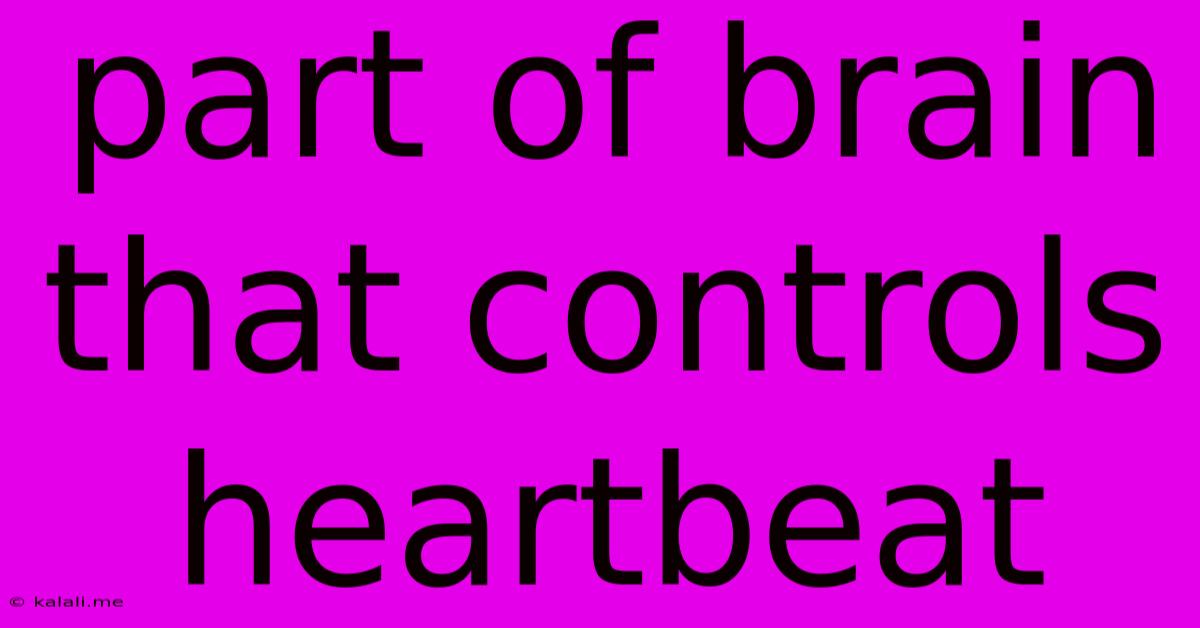Part Of Brain That Controls Heartbeat
Kalali
Jun 15, 2025 · 3 min read

Table of Contents
The Part of the Brain That Controls Heartbeat: A Deep Dive into the Autonomic Nervous System
The human heart, a tireless muscle, beats approximately 100,000 times a day, tirelessly pumping blood throughout our bodies. But what is the mastermind behind this crucial, rhythmic function? While the heart itself possesses a natural pacemaker, its rate and strength are heavily influenced and regulated by the brain, specifically by components of the autonomic nervous system (ANS). This article will explore the intricate relationship between the brain and heartbeat, focusing on the key brain regions involved.
The medulla oblongata, located in the brainstem, plays the most significant role in controlling heart rate. This vital structure acts as the primary control center for many autonomic functions, including breathing, blood pressure, and, critically, heartbeat. Within the medulla, two crucial centers are responsible for this regulation:
1. The Cardioacceleratory Center: Speeding Things Up
This center stimulates the sympathetic nervous system, releasing norepinephrine, a neurotransmitter that increases the heart rate and the force of its contractions. Think of it as the accelerator pedal for your heart. When your body requires a surge of energy—during exercise, stress, or fear—the cardioacceleratory center steps in to increase cardiac output to meet the heightened demands. This process is often referred to as sympathetic activation. Key symptoms of sympathetic activation include increased heart rate, increased blood pressure, and dilated pupils.
2. The Cardioinhibitory Center: Slowing Things Down
In contrast to its counterpart, the cardioinhibitory center activates the parasympathetic nervous system via the vagus nerve. This system releases acetylcholine, a neurotransmitter that slows down the heart rate. Consider this the brake pedal for your heart. When your body is at rest, the cardioinhibitory center is dominant, maintaining a resting heart rate. This parasympathetic regulation ensures that the heart doesn't work harder than necessary. The parasympathetic nervous system is also important in regulating digestion and other bodily functions that are not immediately essential during stressful situations.
Beyond the Medulla: Other Brain Regions Contributing to Heart Rate Regulation
While the medulla oblongata is the primary control center, other brain regions influence heart rate indirectly:
- Hypothalamus: This area plays a role in regulating the autonomic nervous system, influencing heart rate in response to emotional states, temperature changes, and hormonal signals. For example, during a stressful situation, the hypothalamus could trigger the sympathetic nervous system, resulting in an increased heart rate.
- Higher Brain Centers: Areas like the cerebral cortex and limbic system (including the amygdala and hippocampus) can also indirectly influence heart rate via their connections to the hypothalamus and brainstem. Emotional responses processed in these regions can lead to changes in heart rate—think of the racing heart you experience during anxiety or fear.
Understanding Heart Rate Variability (HRV)
Heart rate is not a constant; it fluctuates subtly throughout the day. This variation, known as heart rate variability (HRV), is a crucial indicator of overall health and autonomic nervous system balance. High HRV is generally associated with better health and stress resilience, while low HRV might indicate underlying health issues. Factors influencing HRV include age, fitness level, stress levels, and sleep quality.
Understanding the intricate interplay between the brain and the heart is essential for comprehending various physiological processes and medical conditions. From the medulla's crucial control centers to the indirect influence of higher brain regions, the brain's regulation of heartbeat is a testament to the remarkable complexity and interconnectedness of the human body. Further research continues to unveil the nuanced mechanisms underlying this vital system, leading to improved diagnostic and therapeutic approaches.
Latest Posts
Latest Posts
-
How To Create A Joint Probability Table
Jun 15, 2025
-
What Organelles Contain Their Own Dna
Jun 15, 2025
-
Stevens Institute Of Technology Average Sat
Jun 15, 2025
-
Moment Of Inertia Of A T Section
Jun 15, 2025
-
What Is The Prime Factorization Of 216
Jun 15, 2025
Related Post
Thank you for visiting our website which covers about Part Of Brain That Controls Heartbeat . We hope the information provided has been useful to you. Feel free to contact us if you have any questions or need further assistance. See you next time and don't miss to bookmark.